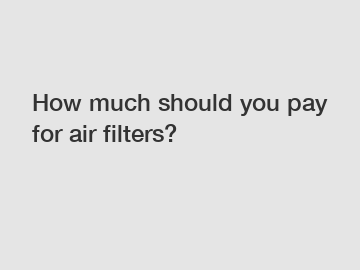How much should you pay for air filters?
How much should you pay for air filters?
Air filters play a vital role in maintaining clean and healthy indoor air quality. They are tasked with capturing and trapping various airborne particles and pollutants, such as dust, pollen, pet dander, and even bacteria. Regularly changing your air filters not only ensures better air quality but also prolongs the lifespan of your HVAC system. However, when it comes to purchasing air filters, the price range can be quite broad. This article delves into the factors that determine air filter prices and aims to answer the question: How much should you pay for air filters?
1. Quality Matters:

One crucial factor affecting the price of an air filter is its quality. Air filters are available in different MERV (Minimum Efficiency Reporting Value) ratings, ranging from 1 to 20. Filters with higher MERV ratings are more efficient at trapping smaller particles. While it might be tempting to opt for lower-priced filters, especially if you're on a tight budget, it's important to consider the potential trade-offs. Cheaper air filters might not capture smaller particles effectively and can lead to clogged filters and reduced airflow, putting a strain on your HVAC system. Investing in filters with higher MERV ratings can often result in better indoor air quality and improved system performance, making them worth the slightly higher price.
2. Consider Filter Type:
Another factor affecting the price of air filters is the type of filter you choose. Fiberglass filters are typically the least expensive option. They offer basic filtration, primarily targeting larger particles. Pleated filters, on the other hand, provide more advanced filtration capabilities. Made from higher-quality materials, pleated filters have a larger surface area for trapping particles, making them more efficient. Due to their enhanced performance, pleated filters generally cost more than fiberglass filters. Additionally, certain specialized filters, such as electrostatic or activated charcoal filters, are designed to target specific pollutants and offer even greater filtration performance. Naturally, these specialized filters tend to be more expensive.
3. Sizing and Compatibility:
The size and compatibility of air filters are also factors influencing their price. It is crucial to select the correct filter size for your HVAC system. Ill-fitting filters can allow debris to bypass the filtration process, reducing their effectiveness. Some systems require custom or non-standard filter sizes, which are often pricier and may not be readily available in local stores. To ensure proper filtration, check your system's specifications and invest in filters specifically designed for your unit. .
4. Quantity and Buying Options:
The quantity of air filters you purchase at once can also affect the price. Buying in bulk often allows for discounts or reduced prices per unit. Additionally, consider where you purchase your air filters. While physical stores offer convenience, online platforms often provide more competitive prices and a wider range of options. Ensure you are purchasing from a reputable source to receive genuine products.
In conclusion, determining how much you should pay for air filters depends on various factors. It is crucial to consider the quality and efficiency of the filter, opting for higher MERV ratings to ensure optimal indoor air quality and system performance. Filter type, sizing, and compatibility are other key elements to factor in when making a purchase. While cheaper filters may seem appealing, compromising on quality can lead to reduced effectiveness and potential issues for your HVAC system. It is recommended to buy filters in bulk and explore online options for competitive prices. By carefully considering these factors, you can make an informed decision and strike the right balance between cost-effectiveness and air quality when purchasing air filters.
Want more information on photocatalyst filter, photocatalyst air filter, primary filter for sale? Feel free to contact us.


